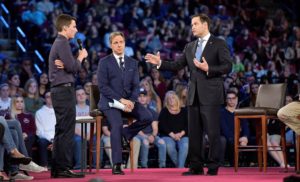There is a name for a certain segment of the population who are young, have made entitlement and a degree of arrogance their psychological cornerstone, with their effect on the workplace and society being extremely detrimental. That name is…”brats.”
You thought I was going to say “millennials,” and that is a part of the problem. A small industry has formed around a sort of preaching against the millennial generation which is, I think, misguided because it not only ducks the real target entirely, but scapegoats a target which is left to be perplexed by why they are taking the raft of crap. Millennials are viewed skeptically as a horde of young people forever taking selfies, swiping right, ditching jobs, demanding everything and not reciprocating appropriately or, most damning, not growing up and joining the real world. There are some young people out there who are precisely like this and they are complete brats.
In every cliche and stereotype there are grains of truth, and some from the millennial generation will come across as terminally spoiled. However, I want to point out that the most prominent examples of these tend to be celebrities. Could it be that such bratty behavior has more to do with the emulation of stars than when an individual was born; that the Kardashian assembly line manufactures incredibly faulty role models?
I’m classified as Generation X, a term that I, myself, don’t like. Sure, I’m bald, but I don’t need a wheelchair and don’t possess amazing mental powers (as frequent readers of my columns constantly remind me). There were some in my generational construct who certainly believed that their feces smelled like Chanel No. 5, and the media made quite a bit off the line that Gen X’rs were lazy and selfish. Equally, there are still some very high-powered Boomers who, frankly, are jerks. Some of them rose through the protest movements of the 1960s to now embody all the things they criticized then, but it’s okay because “now we know better.”
The primary antipathy to the millennials tends to arise from a lack of understanding about them. I cannot claim expertise about them because I cannot see the world from their viewpoint, yet I can see how they might have evolved from where I was to where they are. I’ll attempt to do this in a handful of points.
First point is the terminology. If you ask people who are in the so-called millennial generation subset, they will tell you that they hate the term. It’s yet another catch-all that oversimplifies and marginalizes a spectrum of individuals. There’s some overlap between the makeup of millennials and the Baby Boomers, with the former being conceived (in large part) post-Gulf War and the latter post-WWII. The Boomers were okay with the ad hoc community that congealed around them, but the millennials dislike the concept that the media – and possibly the Boomers themselves – are trying to make a sequel out of them. Or worse, it reduces them to this faceless mass-blob spawned after soldiers came home horny and scared from a war of which they weren’t sure of the objectives. Does anyone really enjoy being lumped in like that?
Second point: respect. I think this is the part that gets the other generations angry the fastest. When we (Gen X…grumble, grumble) graduated high school and college, we too thought we were going to take on the world and run the show. Those who came before us did as well. We quickly had to change our attitudes because we needed our jobs, and therefore, our bravado was swiftly reduced to acceptance. We called it “getting real,” but what it was was a political calculation. That’s not a negative thing. That’s a choice. We decided that we wanted a certainty, a stability that required we stay with the same employer and hopefully work our way up the ranks, as promised so often in fantasies about moving “from the mail room to the boardroom.”
 We may not like the way this young generation insists that, even if they are in the mail room, they will not tolerate being treated like the lowest of the low. Perhaps this was more galling during the super-high unemployment years where so many insisted they wouldn’t be treated like trash and would risk losing their jobs for the defense of their dignity. I myself probably said at one time, oh why don’t you grow up, suck it up, and take it like an adult, neglecting one small detail: I acquiesced where they wouldn’t. Why should I be proud of that?
We may not like the way this young generation insists that, even if they are in the mail room, they will not tolerate being treated like the lowest of the low. Perhaps this was more galling during the super-high unemployment years where so many insisted they wouldn’t be treated like trash and would risk losing their jobs for the defense of their dignity. I myself probably said at one time, oh why don’t you grow up, suck it up, and take it like an adult, neglecting one small detail: I acquiesced where they wouldn’t. Why should I be proud of that?
Third point: the work-life balance. Millennials work as hard as anyone, a truth I’ve encountered in my own work situation, but are not inclined to give away their free time or the off-times promised to them, especially if they don’t have direct stakes in the company or outcome. My parents worked hard. Very hard. It probably took years off of Dad’s lifespan (and certainly contributed to the end of Mom’s). Dad ran a television repair shop in an era where TVs were fast becoming disposable objects. He devoted nights and weekends to keeping the shop, in various incarnations, alive. Mom worked two jobs for several years and it was necessary to do so since the mortgage company didn’t really care where the money came from or where we would go if the house was foreclosed upon.
I know it personally killed them in small, painful ways to disappoint their four kids when, after weeks and months of planning and saving, trips to amusement parks, tourist traps, and oceanside escapes had to be canceled. Mom took it personally, like a failure, a defeat. Dad approached it with bitter stoicism. “I did what I had to do.” I have plenty of friends whose parents were in white-collar positions that, also, had to take the disappointment when the boss said, “Vacations are suspended until X project is ratified by Y committee so that Z product enters the marketplace before the fourth quarter. We’ll let you know when that happens, but don’t leave town.”
I don’t have children, but if I did, I’m pretty sure I’d disappoint them in exactly the same way. I missed my brother John’s college graduation – a significant milestone if there ever was one – because I couldn’t get the time off. I didn’t fight it. I just sucked it up as part of the adulthood process.
What the millennials are saying is not that they won’t work the nights and weekends if you ask them to (and actually pay them), but that they’re going to hold you, the authority figure, to your word. If you promise them a week of vacation time and five sick days, that’s a contract, sometimes verbal, sometimes written. They expect you to not break your contract. If you, as the person who offered the contract can’t handle that, then maybe you should fire them. Maybe they don’t want to work for an organization that condones that level of lax accountability. Maybe they’re not intending to cover Harry Chapin’s “Cats In The Cradle” with their lives in the cyclical (and cynical) way we did.
Therein lies the primary hope of this generation, that after so many years of experiencing firsthand the spoken promises that didn’t come true, the garbage sales pitches, the finest of fine print that constituted loopholes to justify lies and being lied to, the “children that you spit on” won’t be jerked around, they have fully-functional memories and are prepared to use them…
…unlike news anchors and television talking heads. This site has criticized such on more than a few occasions, the way cable news lets the political puppeteers wriggle out of defending their words and actions. Such complicity – all so that such high-powered figures don’t feel embarrassed to the point they’ll never come on the show again – amounts to protectionism. More than a few so-called “liberal media” commentators allowed some very big conservative fish off the hook because the “Big Get” only remains the Big Get if you don’t filet them. It puts the lie to the whole notion of the liberal media that, again and again, individuals can go on a program and float a lie and the host doesn’t challenge it. Worse, the proof of the lie is frequently on tape because that was a statement said on the same show to the same host only months prior. Liberal media? Sounds more like collusion.
 This brings us the the surviving students of the Marjory Stoneman Douglas High School shooting, now collectively called (because, again, we love our boxes) the “Parkland Kids.” On February 21 during a televised town hall, Florida Senator and onetime presidential candidate Marco Rubio was asked by junior Cameron Kasky whether he would “accept a single donation from the NRA” in the aftermath of the event, under the vicious scapegoating perpetuated by the National Rifle Association.
This brings us the the surviving students of the Marjory Stoneman Douglas High School shooting, now collectively called (because, again, we love our boxes) the “Parkland Kids.” On February 21 during a televised town hall, Florida Senator and onetime presidential candidate Marco Rubio was asked by junior Cameron Kasky whether he would “accept a single donation from the NRA” in the aftermath of the event, under the vicious scapegoating perpetuated by the National Rifle Association.
Rubio double-talked, contorted and ran back to safe, carefully crafted talking points. Kasky respectfully but forcefully kept pushing Rubio back onto the rails he consciously kept driving off of. Kasky made the point that if it was completely about the money, what would Rubio do if Floridians funded him at National Rifle Association levels to the degree that he wouldn’t need to kowtow to NRA head Wayne LaPierre?
Rubio kept dodging and, in his campaign to not upset the NRA and never directly utter a bad word against them, he revealed as much about himself as a sweating Richard Nixon did in his famous televised debate against John F. Kennedy. His inability to speak anything but his precision-honed points verified he’d never say a word against his masters, not even in the face of a teenager who was only a hallway away from being shot to death.
Many have given moderator Jake Tapper kudos for his occasional flashes of righteous indignation over the years, but in this moment, this high school student showed infinitely more guts and resolve that either Rubio or Tapper. That is both a hopeful and despairing thing to say.
Kasky has not come out of this unchallenged or without sacrifices of his own, apart from the bloody loss of peers and friends. As a reward for his stand and for founding the #NeverAgain movement, he’s received online death threats; so much so that it has been reported that he had to leave social media. Those who would assail millennials and those even younger as “poor, triggered snowflakes who can’t stand a little heat from Facebook,” specifically to the case of Kasky, demonstrate the disconnection and lack of empathy between these generational divides.
Of course he was “triggered.” The kid, and others, were shot at.
We should not be damning the millennials and the generations thereafter for insisting on the generations prior to them be true to their word. Those previous generations always loved saying, “I remember when a handshake was a man’s word,” but also were the generations that created a high level of litigiousness to combat what they knew intrinsically: that handshake contract wasn’t worth the paper it wasn’t printed on.
We’re facing a new paradigm. A society of people who will take you at your word and hold you accountable to it and, if need be, will actually string you up for breaking promises rather than just swallowing hard and accepting this as the way things are. We ought to be encouraging them, not denigrating their resolve to not be yet another demographic populated by suckers.









Comments